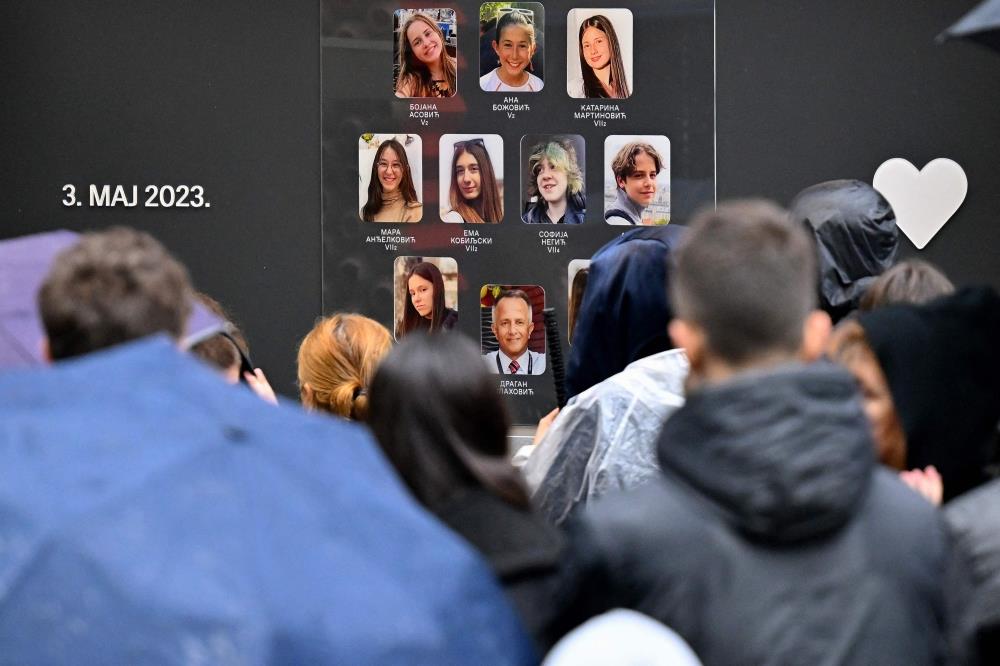
Serbia Marks One Year Since Deadly School Shooting
Belgrade: Serbians held a minute of silence on Friday to mark the one-year anniversary of a deadly school shooting in the capital Belgrade that led to major protests against the government and pro-gun culture.
The attack last May that killed nine students and a security guard at a primary school -- and a second mass shooting a day later -- left the Balkan nation shaken and in mourning.
On Friday morning, students, parents, and Belgrade residents braved the rain outside the Vladislav Ribnikar elementary school to pay their respects, lighting candles and laying flowers near its entrance.
The crowd huddled under umbrellas in front of an art installation displaying photos of the victims from Serbia's worst school shooting in recent history.
"Over the past year, we haven't paid enough attention to all the questions that still trouble us -- such as why this tragedy happened, what its consequences are, and most importantly, what we need to change both in ourselves and in society to prevent such tragedies from happening again," said psychologist Aleksandar Baucal.
Baucal is part of a team working to set up a city memorial to commemorate the attack.
Sirens were sounded to mark a minute of silence at 8.41 am -- the time the attack began -- and television and radio programmes were paused.
"A year has passed since the unprecedented tragedy that left an indelible scar on the soul of the entire country, but pain, disbelief and immense sadness have not passed," said President Aleksandar Vucic.
The parents of the accused teenage shooter are currently on trial in Belgrade. The alleged shooter was 13 at the time of the attack, making him not criminally liable under Serbian law.
Vow to 'disarm'
Prosecutors have said the father had trained the boy to shoot, did not properly secure his weapons and ammunition, and allowed his son to hide a handgun and 92 bullets in his backpack that he later used in the shooting.
The mother is also accused of illegal possession of ammunition.
After the shootings, Vucic vowed to "disarm" the nation with a plan that would crack down on both legal and illicit firearms.
Less than 48 hours after the school attack, eight people were murdered in another shooting spree carried out by a 21-year-old armed with an automatic rifle some 60 kilometres (37 miles) south of the capital.
The shootings sparked massive anti-government protests with tens of thousands hitting the streets where they called for the resignation of top officials and an end to the glorification of violence and gangster culture in the media.
Vucic largely dismissed the protests as a "political" stunt, and peddled conspiracy theories about foreign powers allegedly orchestrating the rallies.
The protest movement later coalesced in a political bloc that challenged Vucic and his party in elections in December, but failed to unseat the government.
Serbia has the highest level of civilian gun ownership in Europe, with roughly 39 out of 100 people owning firearms, according to the latest study by the Small Arms Survey research group.
Weapons feature heavily in the Balkan country's culture, where centuries of occupation, rebellion and war have instilled a martial spirit in the fabric of the nation.
Yet despite the high levels of gun ownership, mass shootings have been rare in Serbia, with school shootings in particular almost non-existent in the country's recent history.

Legal Disclaimer:
MENAFN provides the
information “as is” without warranty of any kind. We do not accept
any responsibility or liability for the accuracy, content, images,
videos, licenses, completeness, legality, or reliability of the information
contained in this article. If you have any complaints or copyright
issues related to this article, kindly contact the provider above.

















Comments
No comment